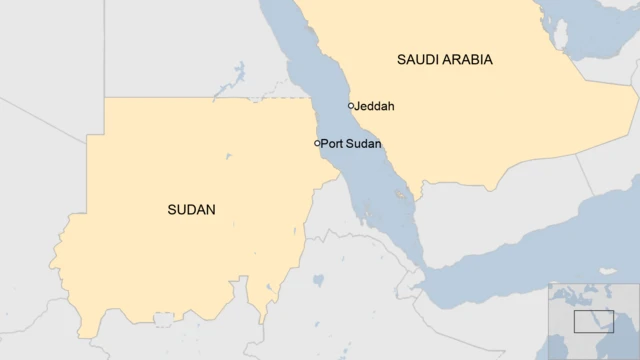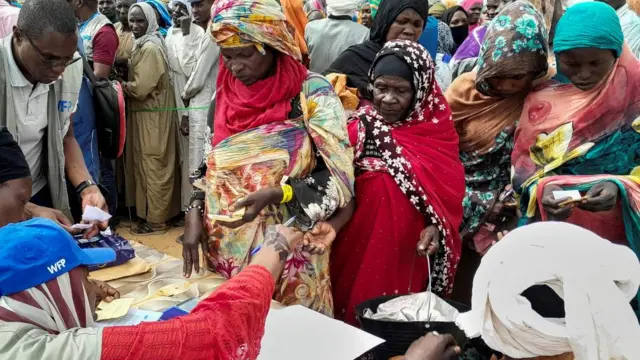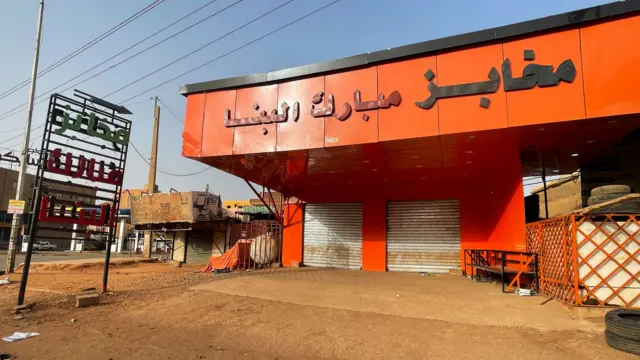What is the Marburg virus?published at 11:29 BST 30 September 2024
Tanzania is the latest African country to have an outbreak of the highly-infectious Marburg virus.
Read MoreThis is an automated feed overnight and at weekends
Tanzania is the latest African country to have an outbreak of the highly-infectious Marburg virus.
Read MoreAn overview of the media in Rwanda, including links to broadcasters and newspapers.
Read MoreProvides an overview of Mauritania, including key dates and facts about this African country.
Read MoreThe government says "stopping the boats" is a key political priority, but how is it going about it?
Read MorePastor Mackenzie's sermons feature calls to sacrifice life and apocalyptic conspiracy theories.
Read MoreFor the latest news, please go to bbc.com/africalive
About 200 Irish citizens and their dependents have been evacuated from Sudan.
Read MoreVideo shows burning chunks of the large building's facade falling to the ground.
Read MoreFormer PM Abdalla Hamdok says the Sudan conflict could become worse than the wars in Syria and Libya.
Read MoreThe government says 1,888 people were rescued in the "extremely successful" evacuation operation.
Read MoreA combative media, a colonial past and rebellious children. Can other royal families help the UK's new monarch?
Read MoreMichael Costain travelled to The Gambia in March but has not returned.
Read MoreOver 20 NHS medics were initially told they could not board flights as they were not British nationals.
Read More
Around 2,000 people have arrived in Saudi Arabia's coastal city of Jeddah, after being evacuated amid chaotic scenes from Port Sudan in eastern Sudan.
Earlier a Chinese military ship with nearly 500 Chinese and Pakistani nationals also made the 12-hour sea crossing.
People from more than 70 countries are now reported to have reached Jeddah from Port Sudan.
Most are expected to be flown home via charter flights arranged by their governments within the next few days.
 Image source, Reuters
Image source, ReutersPeople who've fled Sudan queuing in Chad for UN food aid earlier this week
People continue to flee the conflict by land, air and sea. But there's no food, water or accommodation for the thousands of people who've crossed the border into Chad, according to Aleksandra Roulet-Cimpric of the International Rescue Committee (IRC):
Quote MessageThe humanitarian situation is alarming. Around 20,000 people have arrived since 15 April - mainly women, children and elderly people... They are settled under trees with no shelter. When they arrive there is no access to water... health facilities, no access to any kind of food assistance."
Aleksandra Roulet-Cimpric, IRC in Chad
Speaking to BBC News, she says it's important to resettle the refugees "as soon as possible", before the rainy season makes access roads impassable.
 Image source, Reuters
Image source, ReutersA closed shop in Khartoum - where Nigerian students have complained of food shortages
As our previous post shows, Sudan's capital city attracts university students from across Africa, Asia and beyond. One of the biggest student contingents is from Nigeria.
But many Nigerians say they're still waiting to be rescued from Khartoum, despite seeing their friends from other nations being safely removed.
"There is no presence of the embassy of Nigeria at the International University of Africa. There is no communication. There are only Nigerian students [left there] right now," Abubakar Sadiq Ibrahim told the Reuters news agency.
Other Nigerian students have made similar complaints to the BBC. Nigeria has asked for a safe corridor to evacuate 5,500 citizens, most of them students, Reuters reports.
The fighting broke out when Ibrahim was just two weeks away from completing his degree.
"It's a very sad and unpleasant experience," he said. He cited inflation, food shortages, and walks of 3km [1.8 miles] to buy supplies. "All the shops are closed. There is no movement, there is nothing."
Natasha Booty
BBC News
A student has told the BBC of her relief at being airlifted from Sudan.
"The Chadian embassy helped us and now we are on a plane. I am very happy to come back to my beloved country, Chad," says Ikhbar.
She says dozens of other Chadians are on board the flight, and although she is leaving her university studies behind in Khartoum, she's grateful to have found safety.
"It feels very different, thank God."
More than 220 people have so far been repatriated to Chad, says French-language broadcaster RFI, and the Chadian government is urging others still in Sudan to report to its consulate and register themselves for a return flight.
Chad neighbours the Darfur region in western Sudan, which has seen some of the worst violence since the fighting began.
A UN official told the BBC Newsday programme that as many as 250,000 Sudanese could end up seeking refuge in Chad, despite the country's own security problems and its already struggling humanitarian response to Sudan's crisis.
Watch the moment Muammar Ali meets his three-month-old daughter as his family joins him in the UK.
Read MoreThe RSF paramilitary leader says "We don't want to destroy Sudan" and denies blame for violence.
Read MoreCivilians remain trapped in capital - with one of the warring parties, the RSF, saying it has come under fresh attack.
Read More